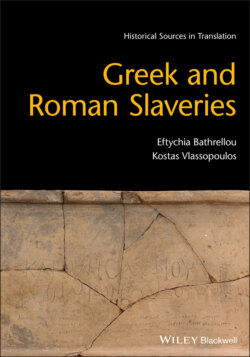Читать книгу Greek and Roman Slaveries - Eftychia Bathrellou - Страница 66
2.16 Alciphron, Letters, 1.2:31 Greek Literary Epistolography (Second/Third Century CE)
ОглавлениеThis passage and the next are not real letters but fictional. Mounychia is a harbor in the Piraeus. Lemnos is an island in north-eastern Aegean, while Rhodes is an island in southeastern Aegean.
Literature: Biraud and Zucker 2018.
Galenaios to Kyrton: All our labors are in vain, Kyrton. During the day, we get scorched by the sun’s heat; in the night, we scrape off the bottom of the sea in the light of torches; and, as the saying goes, we pour our pitchers into the jar of the Danaids. So ineffectual and fruitless is the toil in which we spend our lives. We can’t fill our bellies even with sea-nettles or mussels, while our master gathers in both the fish and the coins. Nor is it enough for him to get all this out of us, but he keeps searching the boat, too. And a little while ago, when we sent this boy here, Hermon, from Mounychia to take our catch to the master, he sent orders so that we should also take to him sponges and the sea-wool that grows luxuriantly in Lemnos. The result was that, before he finished making these extra demands, Hermon left behind the fish-basket, fish and all, left us, too, boat and all, and went off on a rowing boat, having mixed with some Rhodian seamen. Thus, the master had to mourn for a slave, while we for a good fellow-worker.
The name of this letter’s writer derives from the Greek word for the stillness of the sea, while that of his addressee from the Greek word for a fish net. What do these names imply about the genre of this text?
What is the status of addressor and addressee?
What do we learn about their work?
How might Galenaios and his fellow-slaves on the boat have hoped to have fared better if they had had a different master?
How does Hermon manage to escape? What sort of links does he exploit?
Can we use this text as a realistic depiction of social relations?
